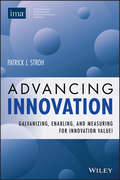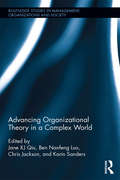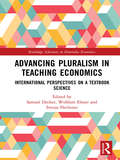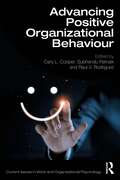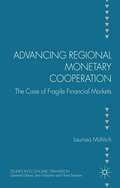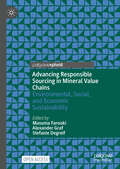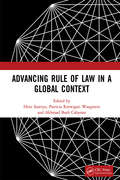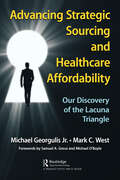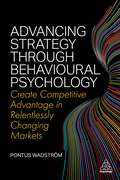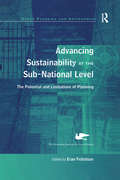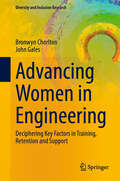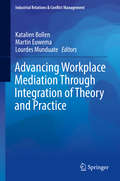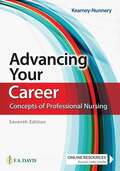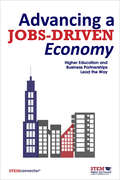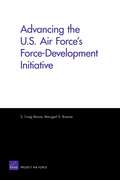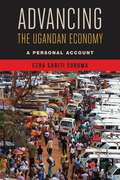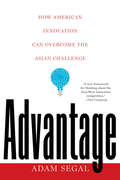- Table View
- List View
Advancing Innovation: Galvanizing, Enabling, and Measuring for Innovation Value!
by Patrick J. StrohMaster the standards and interpretations that govern preparation, compilation, and review engagements with this authoritative resource Advancing Innovation: Galvanizing, Enabling, and Measuring for Innovation Value! provides readers with a comprehensive treatment of how to perform engagements while complying with the Statements on Standards for Accounting and Review Services (SSARS). Newly updated, Advancing Innovation delivers practical guidance for the application of the standards to readers’ specific circumstances. Written by two celebrated accountants and businesspeople, Robert S. Kaplan and Patrick Stroh, Advancing Innovation includes: Fully indexed topics arranged by subject Clarified standards that provide a framework for planning and performing an engagement that meets client needs Explanations of amendments, deleted or superseded content, and conforming changes due to the issuance of other authoritative guidance Perfect for any accountant expected to perform preparation, compilation, or review engagements, Advancing Innovation covers all SSARSs, including SSARS No. 21 through 25, the last of which further converges AR-C section 90 with ISRE 2400 (Revised).
Advancing Leadership Theory and Practice
by Nitin Nohria Rakesh KhuranaMore than a means of getting ahead and gaining power, leadership must be understood as a serious professional and personal responsibility. In this introductory chapter, editors Nitin Nohria, the dean of Harvard Business School, and Rakesh Khurana, a professor of leadership development at HBS, point out that while many university graduate programs in business, law, education, and public policy claim that their mission is to educate leaders who will advance the well-being of society, the reality is that scholarly research on leadership is, at best, at the periphery of these same universities. In fact, the increasing demand for insights about leadership has largely been met by popular writers-consultants, journalists, or "iconic" business leaders. The papers that comprise this book-originally presented at the Harvard Business School Centennial Colloquium, "Leadership: Advancing an Intellectual Discipline"-are a starting point. Nohria and Khurana define five dualities that they believe are at the heart of research on leadership-for example, the duality between the leader's role in producing superior results and the leader's role in creating meaning. The chapter concludes with a brief summary of each of the book's 25 subsequent chapters. This chapter was originally published as Chapter 1 of "Handbook of Leadership Theory and Practice: A Harvard Business School Centennial Colloquium."
Advancing Organizational Theory in a Complex World: Advancing Research in a Complex World (Routledge Studies in Management, Organizations and Society)
by Chris Jackson Jane Qiu Ben Nanfeng Luo Karin SandersWhile research in organisational studies has become increasingly rich and complex, organisation researchers are constantly challenged by the growing quest for theoretical advancement and innovation. To conduct theoretically rigorous and innovative research, contemporary researchers and students must develop in-depth understanding of the theoretical traditions and future prospects of their discipline. This book provides a collection of cutting-edge research topics in the field of organisation and management and offers advanced research findings that explore the frontiers of the field. Advancing Organisational Theory in a Complex World aims to provide deep insights into many influential organisational theories, including, contingency theory, institutional theory, stewardship theory, population ecology theory, ambidexterity, and complexity theory. All these theories have been developed to explain the external and internal factors that influence organisational survival and evolvement. We focus on these theories because they represent some of the most important ways into the modern literature, counter-points to the modern literature, and a breath of fresh air to some theories which should be better known. This book shows the fruitfulness and the continuous vitality of the theoretical field of organisational studies in a critical and innovative way. Finally, this book is dedicated to Professor Lex Donaldson who is a thought leader in the field. The field owed this to Lex, for his lifelong dedication to organisational studies and for his creation and advancement of theories that have inspired several generations of researchers.
Advancing Pluralism in Teaching Economics: International Perspectives on a Textbook Science (Routledge Advances in Heterodox Economics)
by Wolfram Elsner Samuel Decker Svenja FlechtnerThe complex economic problems of the 21st century require a pluralist, real-world oriented and innovative discipline of economics that is capable of addressing and teaching these issues to students. This volume is a state-of-the-art compilation of diverse, innovative and international perspectives on the rationales for and pathways towards pluralist economics teaching. It fosters constructive controversy aiming to incite authors and commentators to engage in fruitful debates. This volume addresses a number of key questions: Why is it important for a social science to engage in pluralistic teaching? What issues does pluralist teaching face in different national contexts? Which traditions and practices in economic teaching make pluralist teaching difficult? What makes economics as a canonical textbook science particular and how could the rigid textbook system be innovated in a meaningful way? What can we learn from school education and other social science disciplines? Through examining these issues the editors have created a pluralist but cohesive book on teaching economics in the contemporary classroom drawing from ideas and examples from around the world. Advancing Pluralism in Teaching Economics offers a valuable insight into the methodology and application of pluralist economics teaching. It will be a great resource for those teaching economics at various levels, as well as researchers.
Advancing Positive Organizational Behaviour (Current Issues in Work and Organizational Psychology)
by Cary L. Cooper Raul V. Rodriguez Subhendu PatnaikThis comprehensive book provides an overview on the present status of positive organizational behaviour, offering insights on the growing body of research and scholarship, as well as suggestions for future directions in the field. Recent times have seen phenomenal and unprecedented changes in work settings, with many transitioning to hybrid or fully remote arrangements. In addition, unwarranted and unscrupulous application of technology, detrimental ramifications of work stress, and impaired well-being at work are posited to create an unsustainable work environment.Bringing together leading experts from around the world, this collection synthesizes and captures the advancements within the discipline of positive organizational behaviour. It covers such topics as: psychological capital, work engagement interventions, self-efficacy, emotions and positive work behaviour, free will, resilience, work wellbeing, evolutionary psychology and positive workplace, cross-cultural positive organizational behaviour, common-good HRM practices, and methodological advances and challenges in positivity assessments.The book offers a valuable resource for students and scholars of work/organizational psychology, organizational behaviour and applications of positive psychology. It is also a useful reference for organizations looking to understand and implement positive organizational policies in their workplaces.
Advancing Regional Monetary Cooperation: The Case of Fragile Financial Markets (Studies in Economic Transition)
by Laurissa MühlichThis book examines regional monetary cooperation as a strategy to enhance macroeconomic stability in developing countries and emerging markets. Interdisciplinary case studies on Southern Africa, Southeast Asia and South America provide a cross-regional perspective on the viability of such strategy.
Advancing Responsible Sourcing in Mineral Value Chains: Environmental, Social, and Economic Sustainability
by Masuma Farooki Alexander Graf Stefanie DegreifThis book examines the responsible sourcing of raw materials within global value chains. With the need for a vast amount of additional raw materials to enable the global green energy transition, it examines the current responsible sourcing landscape, with the aim of bringing clarity and harmony to theories and practices that are characterized by systemic fragmentation. Normative elements are introduced to create a framework for a functioning responsible sourcing system built around the behavioural change of supply chain actors. Drawing from state of the art conceptual ideas and practical experience, an impactful and economically viable approach to the responsible sourcing of raw material is presented. This book sets out a vision of global value chains based on environmental, societal, and economic sustainability. It will be relevant to researchers, policymakers, and practitioners interested in resource economics and sustainable value chains. This is an open access book.
Advancing Rule of Law in a Global Context: Proceedings of the International Conference on Law and Governance in a Global Context (icLave 2017), November 1-2, 2017, Depok, Indonesia
by Heru Susetyo Patricia Rinwigati Waagstein Akhmad Budi CahyonoThe papers published in this proceedings volume are written by a selection of authors, resulting from a call for papers for the 1st International Conference on Law and Governance in a Global Context (ICLAVE) originating from Indonesia and other countries. This proceedings volume shall be a very valuable contribution to understand contemporary law issues in Indonesia which are not always taught in law schools. These proceedings will not only serve as a useful reference for law students and academicians, but also help law practitioners to understand law issues that may be encountered in Indonesia. It covers selected items such as Administrative Law, Constitutional Law, Business Law, Intellectual Property Law, Criminal Law, Human Rights Law, Adat Law, Shariah Law, Judiciary Law and International Law, which are all important for undergraduate and post-graduate law students, as well as academicians and law practitioners in the law community.
Advancing Strategic Sourcing and Healthcare Affordability: Our Discovery of the Lacuna Triangle
by Mark C. West Michael Georgulis, Jr.The United States spends more than 17% of its gross domestic product (GDP) on health care, while other developed countries throughout the world average 8.7% of GDP on healthcare expenditures. By 2028, that percentage in the United States is projected to be 19.7% of GDP. Yet all this spending apparently doesn’t equate to value, quality, or performance. Among 11 high-income countries, the U.S. healthcare industry ranked last during the past seven years in four key performance categories: administrative efficiency, access to care, equity, and healthcare outcomes. This book centers on ways to bring down skyrocketing healthcare costs and improve comparatively low patient outcomes by focusing on the second-highest cost after staffing in U.S. healthcare: the supply chain. The authors present strategies for aligning the healthcare supply chain, leadership, physicians, and department budget owners to achieve evidence-based value analysis (EVA) and effective strategic sourcing. The key to bringing alignment to where it needs to be is understanding the art and science of EVA and strategic sourcing and reorienting the health systems toward productively and gainfully accomplishing them both. Within healthcare, the biggest opportunities for a quantum leap in affordability and quality directly tie to improving the product and service selection process through EVA and greatly advancing hospital and health system supply chain sourcing strategies. The book outlines what the authors call the Lacuna Triangle—three lacunas (or gaps) that occur in hospitals and health systems that prevent them from pursuing effective EVA and strategic sourcing. The authors explore the three effects of those gaps, which keep the Lacuna Triangle walls tightly closed so that the oligopolies, irrational markets, and irrational pricing that those gaps create can continue to thrive, and where many healthcare organizations remain trapped. The goal with this book is to pluck the supply chain and health system executive and clinical leadership out of the chaos and irrationality they are caught in and give them tactics and strategies for reengineering the alignment of these processes to serve their enterprises’ needs. The book does this by a deep exploration into strategic sourcing, a way of doing business that has been embraced and employed effectively for decades in supply chain management in various industries and in healthcare supply chain in other countries.
Advancing Strategy through Behavioural Psychology: Create Competitive Advantage in Relentlessly Changing Markets
by Pontus WadströmAccelerate strategy and achieve desired results with this guide to understanding and influencing employee behaviour, based on the theory and practice of strategic management, behavioural psychology and change.The realisation of strategy is entirely dependent on employee behaviour, so in order to achieve business results it is vital that managers and leaders develop an understanding of human behaviour. Advancing Strategy through Behavioural Psychology shows that by identifying which behaviours should be measured and encouraged, organizations can succeed in implementing strategies for continuous adaptation in a rapidly changing business environment.Grounded in practitioner experience and academic research, this book argues that to achieve set goals organizations should spend less time planning and sending out instructions and more time on providing feedback on implementation and drawing out key points to be learned. By focusing on behaviour in this way, organizations can create a culture where innovation is encouraged and employees want to contribute to the company's future. Ensure long-term success and seize competitive advantage with this essential guide to identifying the key behaviours which will create business results and what influences them.
Advancing Surgical Education: Theory, Evidence and Practice (Innovation and Change in Professional Education #17)
by Debra Nestel Kirsten Dalrymple John T. Paige Rajesh AggarwalThis book is designed for anyone involved in surgical education. While it is intended as a core reference for surgeons who want to develop their surgical education knowledge and practice, it also a valuable resource for anyone undertaking a higher degree in health professions education. Divided into five parts, it starts with chapters on foundational knowledge, exploring the past before documenting the current state of surgical education and highlighting various educational leadership and governance topics. The second part examines a range of theories that inform surgical education – cognitive, behavioural and social, while the third part offers practical guidance on elements of surgical education – curriculum design, selection, feedback, assessment, evaluation, simulation and managing trainee underperformance. It also includes chapters on supporting the development of psychomotor skills, operative skills in theatre, professionalism, teamwork and patient safety. The next part shifts the focus to research in surgical education, introducing readers to all phases of conducting education research based on qualitative, quantitative and mixed methods paradigms. The final part looks to the future of surgical education and of surgical educators. Assembling these topics in one volume makes this book invaluable to anyone involved in surgical education.
Advancing Sustainability at the Sub-National Level: The Potential and Limitations of Planning (Urban Planning and Environment)
by Eran FeitelsonSustainability notions have been widely embraced by planners. However, the question of what can planners contribute to the advancement of such notions has not received much attention until now. This volume examines the potential contribution of planning to the advancement of sustainability at sub-national level, and the limitations it faces in doing so. Bringing together case studies from the US, UK, Poland, Israel, South Africa, The Netherlands and Italy, it covers a wide range of issues and contexts, ranging from the metropolitan to the community level. On the basis of these case studies, the book shows that planners do indeed have a variety of options to advance sustainability notions at these levels, and appear to be doing so. The book proposes that planners should operate at two levels: firstly to change institutional structures, and secondly to advance sustainability notions incrementally in the meantime, within the existing institutional constraints.
Advancing Women in Engineering: Deciphering Key Factors in Training, Retention and Support (Diversity and Inclusion Research)
by John Gales Bronwyn ChorltonThe percentage of women applying for engineering licensure remains well below the percentage of women enrolling in engineering undergraduate programs--an issue of retention that continues throughout women engineers' career trajectories. Although there have been many efforts on the recruitment side to attract people of varying genders to study engineering and join the profession, such efforts are ineffective if this diverse population is not retained in engineering. This book identifies the factors affecting the recruitment of women into, and the retention of women in the engineering profession. The authors examine the experience of male and female students at the high school, undergraduate, and graduate levels to better understand women's experiences at each stage in their careers through to becoming industry members or academics. Issues such as intimidation and discouragement at the undergraduate level, disproportionate funding and support at a graduate student level, and the correlation between retention and opportunities for collaboration at an industry/academic level are discussed. The book concludes by highlighting the key findings affecting the retention of women in engineering and offers potential solutions. The findings covered in this book may be used by engineering postsecondary institutions and workplaces to create a more diverse and inclusive environment. This book is also useful to researchers, scholars, students, and academics interested in the retention of women in STEM industries.
Advancing Wood Architecture: A Computational Approach
by Achim Menges Tobias Schwinn Oliver David KriegIn light of environmental challenges architecture is facing, wood is no longer regarded as outmoded, nostalgic, and rooted in the past, but increasingly recognized as one of the most promising building materials for the future. Recent years have seen unprecedented innovation of new technologies for advancing wood architecture. Advancing Wood Architecture offers a comprehensive overview of the new architectural possibilities that are enabled by cutting-edge computational technologies in wood construction. It provides both an overarching architectural understanding and in-depth technological information through built projects and the works of four leading design research groups in Europe. The projects presented include large scale, permanent buildings such as the ETH Arch-Tec Lab Building in Zurich, the Landesgartenschau Exhibition Hall near Stuttgart and the Boiler House in Hooke Park, UK, as well as, built research prototypes investigating additive robotic fabrication, folded plate structures and meteorosensitive building skins. Illustrated in full colour, the book showcases the latest technological developments in design computation, simulation and digital fabrication together with an architectural, engineering and manufacturing perspective, offering an outlook towards novel spatial and constructional opportunities of a material with unrivalled ecological virtues.
Advancing Workplace Mediation Through Integration of Theory and Practice (Industrial Relations & Conflict Management)
by Martin Euwema Lourdes Munduate Katalien BollenThis book compares the unique features of workplace mediation to other contexts of mediation, as well as the specific competences each situation requires of the mediator. It covers many important issues related to workplace mediation and discusses interventions by managers, such as conflict coaching and informal mediation. It proposes a new model to assess the effectiveness of mediation, and discusses the impact of legal systems, HRM policies, as well as power structures, and cultural differences. The book takes into account perspectives from multiple disciplines, such as management, business, psychology, law and sociology. It also discusses mediation aspects from a variety of cultural and regional contexts. The book advances knowledge about the application, process and effects of workplace mediation and includes practical tips for scholars, practitioners, mediators and managers to enhance their mediation practice or to foster constructive conflict management in organizations.
Advancing Your Career: Concepts of Professional Nursing
by Rose Kearney NunneryAdvance your career to the next level of professional practice! <p><p> Here are all the concepts and theories practicing RNs need to continue their education and reach the next level of professional practice. You’ll find in-depth coverage of the critical components of professional nursing practice, including effective communication, professional ethics, leadership, group theory, teaching/learning, and multicultural issues. <p><p> Explore the challenges and issues that are changing the field of nursing. Then, apply them to the situations you encounter in practice today . . . and to the challenges you’ll encounter tomorrow.
Advancing a Jobs-Driven Economy: Higher Education and Business Partnerships Lead the Way
by STEMconnector®Aligning corporate, education, and community partners requires that we rethink and redesign the system that supports Science, Technology, Engineering and Mathematics (STEM) education and workforce preparedness. What’s at stake? Nothing less than the sustainability of our schools, the innovative engines of our businesses, the prosperity of communities, and the global competitiveness of our economies. Advancing A Jobs Driven Economy is a call to action and provides the framework for how business, education, and communities can cultivate a sustainable pipeline of STEM talent.
Advancing the Frontiers of Heterodox Economics: Essays in Honor of Frederic S. Lee (Routledge Advances in Heterodox Economics)
by Tae-Hee Jo Zdravka TodorovaThis collection of essays honors the life and work of one of the most prominent and fervent heterodox economists, Frederic S. Lee, who has been at the heart of the heterodox economics movements for the past three decades. Authors in this book demonstrate that heterodox economic has transcended the criticism of mainstream economics and, more importantly, that constructive developments are in the making by way of cross-communications among various heterodox economics traditions. Frederic S. Lee’s contributions to heterodox economics are centered on three themes: the making of a history and identity of heterodox economics, heterodox microeconomics, and the heterodox analysis of social provisioning. Part I addresses the importance of history, theory, research methods, and institutions in the making of the identity of heterodox economics as an alternative to mainstream economics. Part II delves into heterodox microeconomic theories—in particular, investment, pricing, competition, markets, and market governance—as foundations of heterodox macroeconomic analyses. Part III expands the analysis of the capitalist social provisioning process with an emphasis on its subsystems and their relationships over historical time. Part IV encapsulates the life and work of Frederic S. Lee. Throughout his intellectual life Frederic S. Lee has shown to many that the development of heterodox economics is rendered possible by unselfish and ceaseless efforts to build both theory and institutions. Essays in this book attest that establishing an alternative critical theory to the status quo is not only possible but also serviceable to the majority of the population.
Advancing the Myth: Sustaining an Iconic Brand Over Time
by Douglas B. HoltEven the most successful iconic brands routinely stumble when it comes to managing a brand myth so that it remains vital for many years. To extend a powerful myth, the brand's communications must steer a path between two traps: milking the myth to capitalize on its popularity, and abandoning the myth entirely to pursue the next big trend.
Advancing the U.S. Air Force's Force-Development Initiative
by S. Craig Moore Marygail K. BraunerThe following steps are recommended for consistent, efficient, and effective plans and means for improving the development of U.S. Air Force officers in their career fields: (1) identify the demand for jobs in the field grades-major, lieutenant colonel, and colonel; (2) ascertain the backgrounds that officers have accumulated (assess the supply); (3) compare supply with demand (gap analysis); and (4) plan ways to close the gaps.
Advancing the Ugandan Economy
by Ezra Sabiti SurumaInternal conflicts, dictatorship, and economic disintegration characterized the first twenty-five years of Uganda's independence from British colonial rule, which culminated in the reign of Idi Amin and a violent civil war. The country has since achieved an astounding turnaround of stability and growth. Advancing the Ugandan Economy is a first-hand look at the remarkable policy changes that took place from 1986 to 2012 and their effect in contrast with the turbulent events after independence.Ezra Suruma held several key positions in the Ugandan government during the nation's transition period, including minister of finance. His insightful recounting of those times demonstrates that African countries can achieve economic stability and sustain rapid growth when they meet at least two interdependent conditions: establishing a stable and secure political framework and unleashing entrepreneurialism. Suruma also highlights the strategic areas that still require fundamental reform if Uganda is to become a modern state and shares his vision for the future of his country.Rarely in African history has so much positive political and economic transformation of a country been achieved in such a short time. Suruma's account of the commitment, determination, vision, and dexterity of the Ugandan government holds invaluable lessons in managing the still complex policy challenges facing the African continent.
Advancing the Ugandan Economy: A Personal Account
by Ezra Sabiti SurumaInternal conflicts, dictatorship, and economic disintegration characterized the firsttwenty-five years of Uganda's independence from British colonial rule, which culminatedin the reign of Idi Amin and a violent civil war. The country has since achieved anastounding turnaround of stability and growth. Advancing the Ugandan Economy isa first-hand look at the remarkable policy changes that took place from 1986 to 2012and their effect in contrast with the turbulent events after independence. Ezra Suruma held several key positions in the Ugandan government during the nation'stransition period, including minister of finance. His insightful recounting of thosetimes demonstrates that African countries can achieve economic stability and sustainrapid growth when they meet at least two interdependent conditions: establishinga stable and secure political framework and unleashing entrepreneurialism. Surumaalso highlights the strategic areas that still require fundamental reform if Uganda is tobecome a modern state and shares his vision for the future of his country. Rarely in African history has so much positive political and economic transformationof a country been achieved in such a short time. Suruma's account of the commitment,determination, vision, and dexterity of the Ugandan government holds invaluablelessons in managing the still complex policy challenges facing the African continent.
Advantage: How American Innovation Can Overcome the Asian Challenge
by Adam Segal"Thoughtful . . . . [Segal's] striking argument is that the challengers [India and China] lack America's resilient, open and risk-taking culture." --Economist The emergence of India and China as economic powers has shifted the global landscape and called into question the ability of the United States to compete. Advantage sorts out the challenges the United States faces and focuses on what drives innovation, what constrains it, and what strengths we have to leverage. Entirely recasting the stakes of the debate, Adam Segal makes the compelling case for the crucial role of the "software" of innovation. By bolstering its politics, social relations, and institutions that move ideas from the lab to the marketplace, the United States can preserve its position as a global power. With up-to-the minute economic and political data, this is a resounding call to tie innovation to larger social goals in an age of global science and technology.
Advent International and Walmart Brazil's Deal
by Victoria Ivashina Ruth Costas Pedro LevindoAdvent International, one of the world's leading private equity firms, must decide whether to acquire Walmart's subsidiary in Brazil or not. Although Walmart Brazil is losing cash at a rapid pace, Advent thinks it has a solid plan to recover the company's finances. However, there are several execution risks associated with the deal and local analysts are skeptical about the possibility of a quick turnaround.
Advent International: Kroton Investment
by Victoria Ivashina Priscilla Zogbi Ruth KostasCase - Finance
